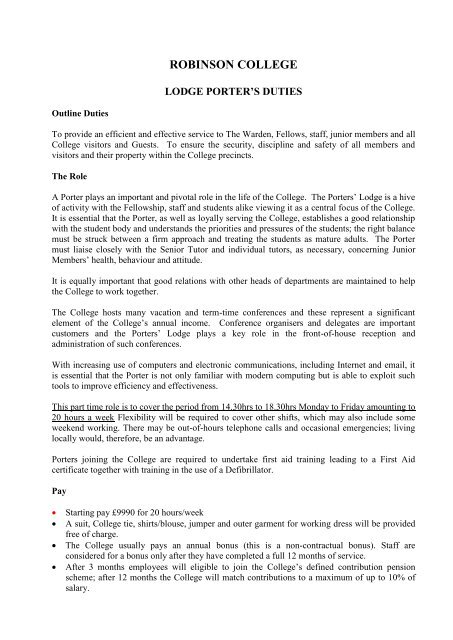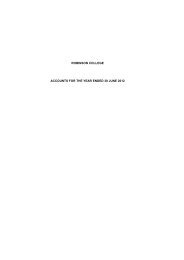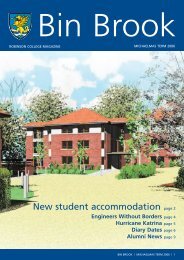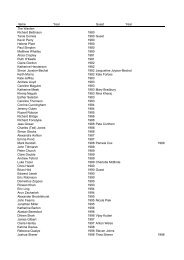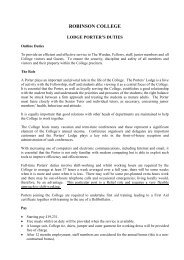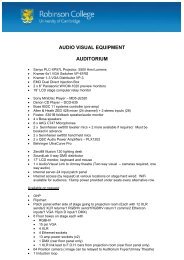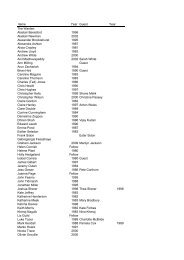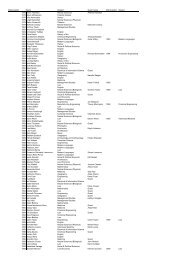You also want an ePaper? Increase the reach of your titles
YUMPU automatically turns print PDFs into web optimized ePapers that Google loves.
<strong>ROBINSON</strong> <strong>COLLEGE</strong>LODGE PORTER’S <strong>DUTIES</strong>Outline DutiesTo provide an efficient and effective service to The Warden, Fellows, staff, junior members and allCollege visitors and Guests. To ensure the security, discipline and safety of all members andvisitors and their property within the College precincts.The RoleA Porter plays an important and pivotal role in the life of the College. The Porters’ Lodge is a hiveof activity with the Fellowship, staff and students alike viewing it as a central focus of the College.It is essential that the Porter, as well as loyally serving the College, establishes a good relationshipwith the student body and understands the priorities and pressures of the students; the right balancemust be struck between a firm approach and treating the students as mature adults. The Portermust liaise closely with the Senior Tutor and individual tutors, as necessary, concerning JuniorMembers’ health, behaviour and attitude.It is equally important that good relations with other heads of departments are maintained to helpthe College to work together.The College hosts many vacation and term-time conferences and these represent a significantelement of the College’s annual income. Conference organisers and delegates are importantcustomers and the Porters’ Lodge plays a key role in the front-of-house reception andadministration of such conferences.With increasing use of computers and electronic communications, including Internet and email, itis essential that the Porter is not only familiar with modern computing but is able to exploit suchtools to improve efficiency and effectiveness.This part time role is to cover the period from 14.30hrs to 18.30hrs Monday to Friday amounting to20 hours a week Flexibility will be required to cover other shifts, which may also include someweekend working. There may be out-of-hours telephone calls and occasional emergencies; livinglocally would, therefore, be an advantage.Porters joining the College are required to undertake first aid training leading to a First Aidcertificate together with training in the use of a Defibrillator.PayStarting pay £9990 for 20 hours/weekA suit, College tie, shirts/blouse, jumper and outer garment for working dress will be providedfree of charge.The College usually pays an annual bonus (this is a non-contractual bonus). Staff areconsidered for a bonus only after they have completed a full 12 months of service.After 3 months employees will eligible to join the College’s defined contribution pensionscheme; after 12 months the College will match contributions to a maximum of up to 10% ofsalary.
The College administers a private health care scheme which is open to all members of staff tojoin and provides relatively inexpensive health insurance for members and their families.Paid holiday entitlement is currently 33 days including 8 days public holiday.Free on-site parking.Further details and application form are available on our websitehttp://www.robinson.cam.ac.uk/about/jobs.php or from the Head Porter (email cdb34@cam.ac.uk,telephone 01223 339227). Applications, in the form of a completed application form, current CVand covering letter/email with the names of two referees should be sent to the Personnel Officer,Robinson College, Cambridge CB3 9AN or by email to cdb34@cam.ac.uk to arrive by the closingdate of 20 May 2013. An Equal Opportunities monitoring form is also available and we ask this isalso completed (this is not compulsory).
observed, Fusilade Super 125 EC herbicide was used at the dose of 2 dm 3·ha -1 . Colorado beetle was controlledwith Fastac 10 EC preparation (0.1 dm 3·ha -1 ) and potato blight with Ridomil MZ 72 WP fungicide (2 dm 3·ha -1 ).Potatoes were harvested in the second decade of September. At harvest on each plot tuber fresh matter yield wasdefined, and then 5-7 kg tuber samples were taken for chemical analysis. In tuber fresh matter the followingwere determined: the content of dry matter with the oven-drying and gravimetric method [20], of starch with theReimann method [27], of vitamin C with the Pijanowski method [20] and of glycoalkaloids with the Bergersmethod [4]. In tuber dry matter the content of true protein was defined with the Kjeldahl method afterprecipitation with trichloric acid [12]. The results obtained were statistically verified.Table 1. Weather conditions over the research period (1997-2000)YearMonthApril May June July August September OctoberMeanTemperature, °C1997 5.1 14.9 17.7 19.9 20.4 13.9 5.6 13.91998 9.3 15.9 18.8 18.8 17.4 13.1 7.4 14.41999 9.9 12.9 20.5 21.8 18.7 16.1 8.0 15.42000 12.9 16.4 19.5 19.0 19.1 11.8 11.7 15.8Mean for1951-19907.2 13.2 16.2 17.6 16.9 12.7 8.0 13.1Precipitation, mmTotal1997 21.5 24.5 51.5 191.3 5.7 11.5 26.6 332.61998 42.6 73.1 48.7 63.3 58.5 36.5 26.2 348.91999 87.3 26.4 121.7 21.9 77.4 27.8 11.6 374.12000 47.5 24.6 17.0 155.9 43.6 61.1 3.2 352.9Total for1951-199029.4 54.3 69.3 70.6 59.8 48.2 32.0 363.6The four-year research period showed changeable weather conditions in respective vegetation periods (Table 1).The annual rainfall was not evenly distributed in time and showed a various intensity, which showed a directeffect on growth, development and yielding of spring barley, intercrop companion crops and potato cultivateddirectly after companion crops and barley straw plough-in.RESULTS AND DISCUSSIONIn potato fertilisation manure can be substituted with straw remaining in the field after cereals harvest.According to Mazurek [18], changeable weather conditions in respective years affect considerably the cerealplant growth and development as well as the availability and use of nutrients and the effectiveness ofphotosynthesis, which results in substantial annual fluctuations of the assimilation area and their photosyntheticefficiency leading to a varied yielding. All that observations were confirmed in the present research.Significantly highest straw yield was recorded in 1999 which was favourable for spring barley cultivation.Significantly lower yields were recorded in 1998 and 1997 of unfavourable weather conditions (rainfall deficit)over the vegetation period (Fig. 1).


